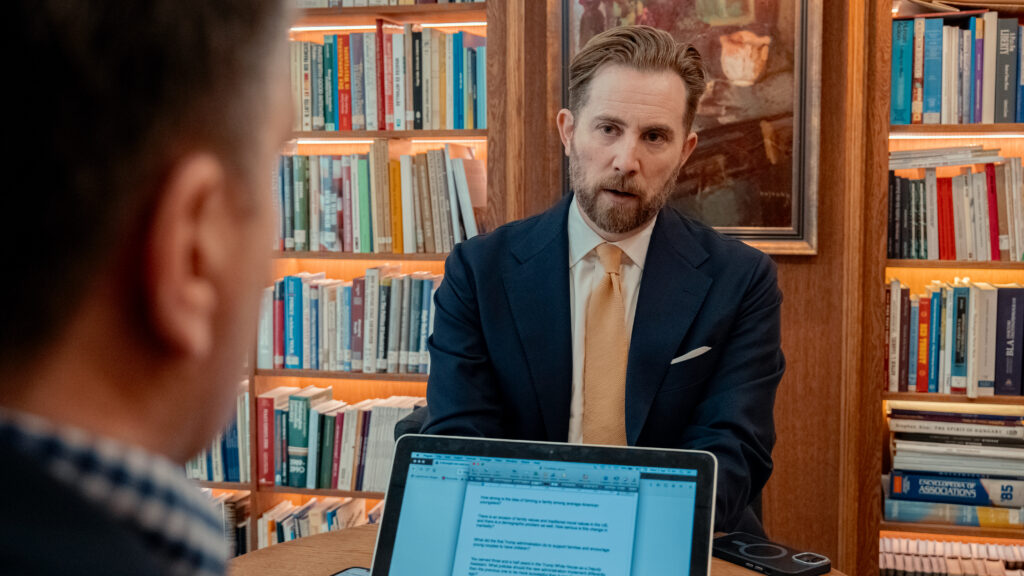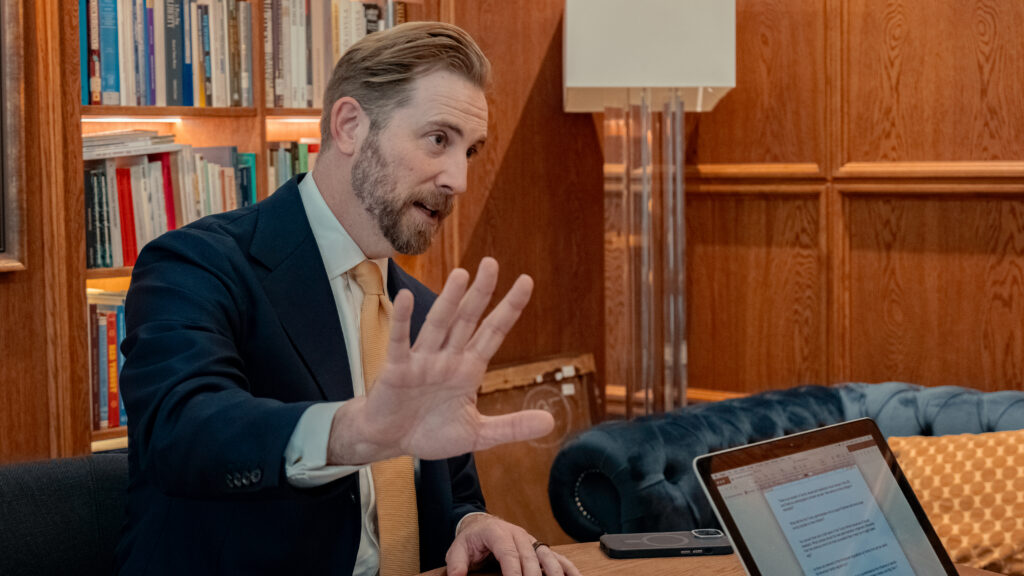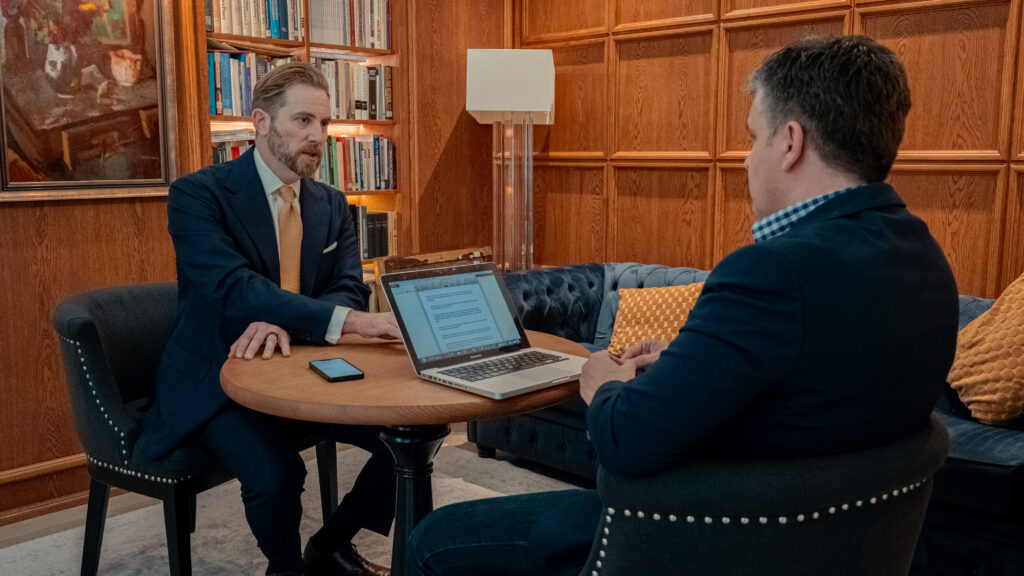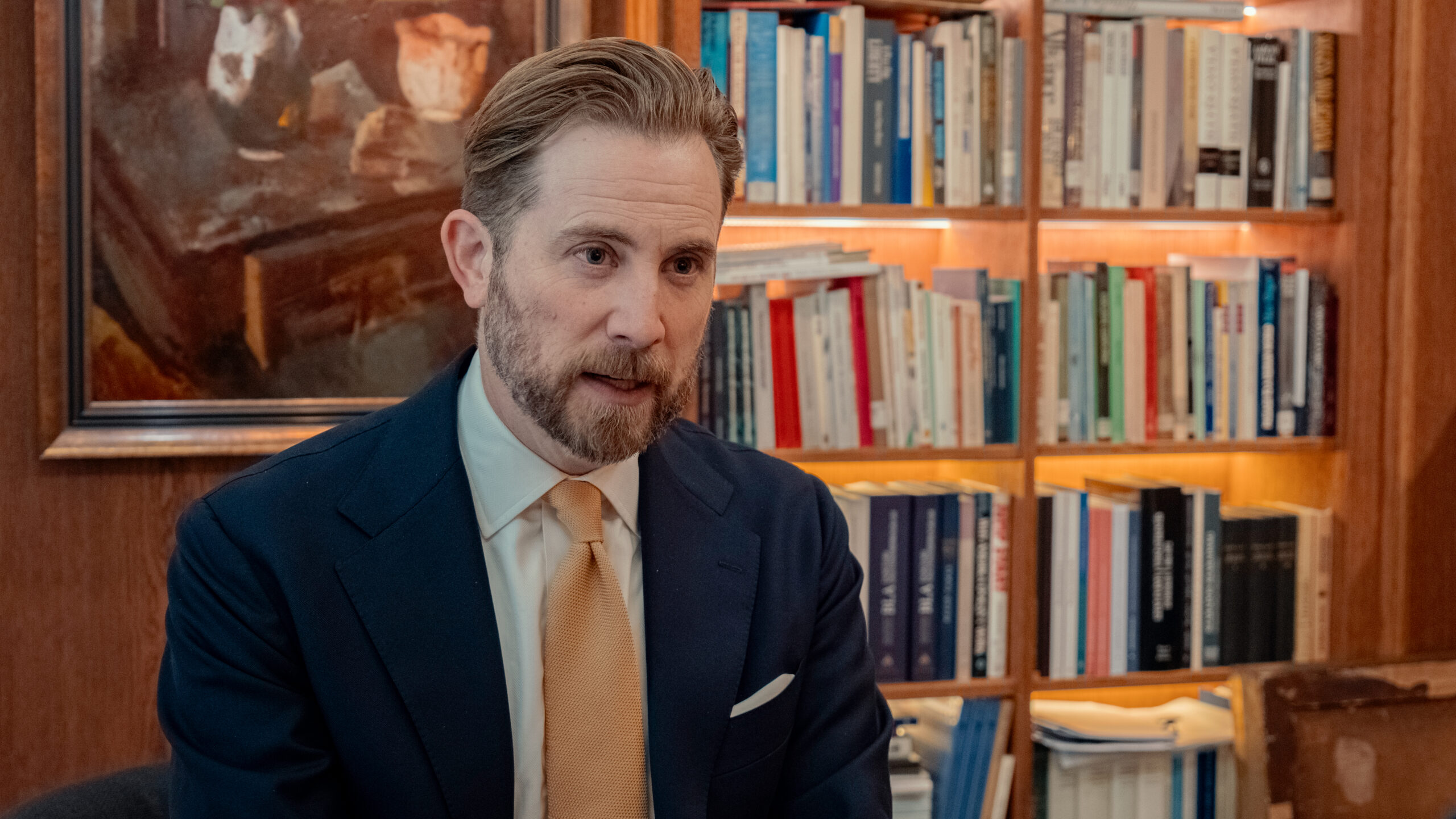Theo Wold is the Director of Administrative State Project at the Claremont Institute’s Center for the American Way of Life. He’s a Former Deputy Assistant to President Trump, served three and a half years in the White House, prior to that he clerked at the United States Court of Appeals for the District of Columbia Circuit and the United States District Court for the District of Puerto Rico, was the Solicitor General of Idaho, and served as Deputy Chief Counsel to US Senator Mike Lee on the Senate Judiciary Committee. Wold and his wife have five children and live in Boise, Idaho.
***
You work for the Center for the American Way of Life. Is family a fundamental part of the American way of life?
Yes, certainly. There is no American way of life without the formation of strong families with the support of and the need for young people to enter into vibrant marriages where children are possible for those who can have them. I think this is a part of American political discourse that maybe in the early 20th century was taken for granted, and then in the later part of the 20th century, children were seen sort of as an incidental effect in family life. There was a focus on marriage, obviously, as the LGBTQ movement took on steam both politically and legally. And then there was a focus on the sexual license and the sexual revolution, and less of a focus on how we build strong families that are open and willing to bring children into the public.
How strong is the idea of forming a family among average American youngsters?
The millennial generation is still something of an oddity. But I think younger Millennials, and then the Zoomers, as we call the Generation Z, are in many ways just a total rejection of the excrescence of modernity. They are more religious, not just spiritual; they are orthodox in their religious beliefs. They are more likely to get married and to get married younger, and they are more open to larger families. There are a few positive changes, from the way public transportation works: there is space for mothers, expectant mothers or children, to the kinds of entertainment, movies, and music that are more open to the sensitivities of children and the needs of families. It’s a total sea change.
‘The Zoomers, as we call the Generation Z, are in many ways just a total rejection of the excrescence of modernity’
It’s interesting to hear that, because I was about to ask you how the erosion of family and traditional moral values has damaged the mentality of the newer generations.
Well, I think the real damage is that the pathologies of the Baby Boomers, who are an incredibly selfish, self-aggrandized, egoistic generation, were really passed on to Generation X and Millennials. Generation Z is almost like a dissident. Jean jackets, leathers and chains, motorcycles—they are rejecting all of this cultural typology of the boomers. So sexual license, small families or no children at all, multiple partners, materialism and secularism—this generation of young Americans, who are rising despite their overuse of technology, is living more and more in a traditional way. It is a surprising phenomenon, but one that gives me, personally, a lot of hope.

Are you talking about this with statistics at hand? Do you have proof of this?
I think the best proof we have that’s objective is sort of the attitudinal surveys that are done of the different generational cohorts. Generation Z is more open to orthodox religious practice. This is why you see a disproportionate number of Gen Z men entering into the Eastern Orthodox churches. The same sort of attitudinal surveys will indicate that Zoomers are more interested in marrying young. Their view of when marriage should be considered is in the 23-to-29-year-old range, as opposed to Millennials, who were 33 to 42. Gen Z men were self-described more likely to be Republicans or conservatives, and they voted that way in the 2024 election. President Trump became the first Republican candidate in decades to make a significant inroad among young voters, and it has left the Democrats perplexed and afraid, because they really don’t understand what this cultural phenomenon is all about.
I’m surprised too, because in recent years we have read a lot about the identity politics of the Left, the woke movement at universities, the influence of the mainstream media and the Big Tech stuff. But you say that the reality is the opposite: against all these influences, the new generation tries to find the old order, like what their grandparents had.
In my work in government, and also with the Claremont Institute, and then in my military service, I met a lot of 22–24-year-olds. What I’ve learned from talking with them is that many of them are survivors. It’s almost a kind of skill set you would have seen in the Soviet Union: they learned to get through the woke at the universities. They learned to communicate in a way through technology that would enable them to remain socially connected. But now that they are entering adulthood out of the university, after their first jobs, they are more and more free with their views, and their views reject the consensus on race politics in America. Their views reject modern feminism or the American variety of secularism. And so I think they fooled all of us, and I think they are more Machiavellian, if you will. They knew how to navigate the systems. To use that phrase of President Nixon, there was a silent majority in the young, rising generation that played the game, but now is increasingly free with its views and its rejection of what was once dominant, modern liberalism.
‘President Trump became the first Republican candidate in decades to make a significant inroad among young voters, and it has left the Democrats perplexed’
What role did the first Trump administration play in creating this new phenomenon? What did you do for this generation during the first term?
I don’t think this generational shift is possible without the first Trump presidency; it’s just not possible. So many of these young people say: ‘I entered political maturity watching what Trump was doing.’ And Trump normalized a lot of taboos. These young people are now going beyond Trump in many ways. Some of them will say Trump is too moderate for them. They want someone who’s more willing to fight with the Left. President Trump was really the first candidate in my lifetime to talk about the effects of globalism, mass immigration, and the liberal government leaving cities without economic prosperity and a clear pathway out of drug addiction, crime, and violence.
I was an early supporter of the President, and then working in his White House, my focus as a native Californian was on these effects of mass immigration, and really how they were destabilizing not just American families, but ultimately also the American economy. I think we had a lot of great successes, but there was also this element of the deep state and sort of the permanent bureaucracy, its refusal to help the President enact his democratically elected will. And I think that’s one of the big changes now to see Elon Musk’s DOGE team and the President’s legal team work so expeditiously, so quickly to confront the deep state, and we’ll see whether they succeed.

Do you agree with the way they are doing it now? Some say that a real counter-revolution is going on in Washington, DC.
I agree, it is a counter-revolution. But the outcome is still unknown. I hope the President and his current team are successful, but the federal courts are aligned against them, the media apparatus is obviously as well, and there is this unique ability of the Left to take, what I call, a micro-narrative and to make it the big issue. So the micro-narrative now is something like this: these cuts to personnel in the federal government are also hurting the communities that voted for the Republicans, who voted for Trump, and now they ask: ‘Aren’t you ashamed for voting for Trump?’ Because your employment is being ended.
I think in any counter-revolution there’s going to be some pain. There are going to be some difficulties to get beyond the Roosevelt imperial presidency that has really controlled America for almost 100 years. There has to be a significant, seismic change. That’s what’s happening right now. What’s most important is that the President had the will to engage in the battle and that they are moving quickly. I agree that there needs to be a little bit more precision in some of the cuts and some of the changes, and yet the President has put the emphasis on moving quickly, and that’s so important. The lesson learned from the previous government was that the President can’t engage with the deep state, the media apparatus, the far Left in a game of chess. It needs to be like a game of dodgeball. It needs to be quick.
Do you think the Trump administration should approach family policy differently in its second term than it did in the first? Did you do enough?
I don’t think we did enough, but I don’t think enough credit is given to what we did do. The President’s daughter, Ivanka Trump, led a large portfolio of issues, on changing the way we compensate paid family leave, on how we incentivize parents to have children and also maintain their economic mobility. I don’t think she got enough credit, because at the time that was seen as a breaking of the established Republican economic doctrine. You don’t interfere in the marketplace. You shouldn’t be providing subsidies, whether it’s for the good of the nation or to encourage families and children. You don’t do that kind of thing. And I think what we’ve seen instead is that it had a demonstrable benefit to a lot of working people to be given this kind of economic assistance to encourage marriage, to encourage families to have more children. So I think it was a good start. I think there are lots of ideas that Ivanka has for a second term.
‘The President can’t engage with the deep state, the media apparatus, the far Left in a game of chess. It needs to be like a game of dodgeball. It needs to be quick’
Is there any element of the Hungarian regulations on family that could be incorporated into the American system of law?
Obviously. I think one of the interesting things about the America First policy agenda is they’re keenly aware of what works among our allies. Social policy in Hungary is known. This isn’t like the old sort of Reagan or Bush years, when there was an American model, and we would lead, and everyone else would follow us. Instead, we will go to the buffet of good ideas, and we’ll select the best policies and see if we can implement them here. It’s most certainly the case that there are problems with our child tax credit policy in the US. I think the kinds of things you’ve done in the tax policy here in Hungary are obviously things that we should consider doing in the United States, incentivizing maternity leave, providing that kind of economic stimulus for mothers. There is a special value to mothers who essentially birth the nation. And the law and the economy should reflect that special privilege and that special capacity of women to bring new citizens into the world.

And I think that’s missing in America, and I think it would be really powerful for us to adopt that. The President has spoken pretty openly about the need for the government to support reproductive technologies and to ensure that, where there is a fertility crisis, the government is supportive of families that want to have children or more children. I think the tax policy here and the financial incentives for motherhood that then create this social capital for families, that’s something that the US should be working to incorporate in our law.
You are from Idaho, probably the most rural and down-to-earth state in the US. Are life or the values profoundly different from those in other states or the big cities of America?
Me and my wife made the conscious choice after the White House job ended in 2021 to move to Idaho for precisely these reasons. Because of its sectarian makeup, there are strong evangelicals and a strong Latter-day Saints population. It is known to be very family-friendly. In fact, Idaho has the highest birth rate of any state among native Americans. Families are welcome in public life in Idaho; it’s extremely safe, with very low crime statistics, and it’s an extremely patriotic place. It’s very community-oriented, and people are very involved in civic life; they follow politics closely. It is truly one of the last places where that Western spirit of independence exists. People don’t want to be relying on the government. They’d rather be relying on their neighbours. You see something in the scenery there that’s very reminiscent of the parts of Central Europe that I know you all love the best, and hopefully, as we creep along in this administration, it will be places like Idaho and Montana that really incubate American culture. That’s where you will find real American culture thriving and flourishing.
If you visit Budapest and sense the atmosphere, the mentality, do you feel a bit more connected to us than to a New Yorker as an Idahoan?
Without a doubt. You have better music, better food and better architecture by far. And there is something here in Budapest that is very reminiscent of the same kind of culture we’re trying to preserve in Idaho.
Related articles:








